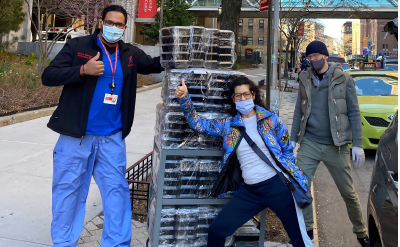CURA COLLECTIVE
Helping Those In Need
The Cura Collective is a new non-profit aimed at helping communities rebuild in the wake of major disasters by partnering with local businesses, driven by a belief that the most potent care comes from within our community.
Cura was founded in April 2020 out of a desire to do more to help those most hard hit in New York City during the burgeoning Covid-19 pandemic.
Last year saw the Cura founders Lizzie Asher, Nora Boyd, Mercedes de Guardiola, Casey Kohlberg, and Laura Day Webb personally deliver tens of thousands of meals in the greater New York City area. Their original aim was to support hospital workers on the frontline but then expanded to support kids facing food insecurity.
Starting with a few small connections between existing businesses and the frontline workers and utilizing their broad range of experience across the business and non-profit sectors, they established Cura Collective for a new kind of philanthropic support.
“We are driven by a belief that the people and communities around us give the most powerful care,” says Lizzie Asher. “Our neighborhoods are the ecosystems that support us, and even seemingly small actions can be largely impactful, even more so during difficult times.”
FROM THE HEART
Taking inspiration from the heart shown by Italy during the COVID-19 pandemic, ‘Cura’ translates simply to ‘Care.’ The group believes that the most effective care during a crisis comes through one’s community coming together to help those among them who need it most. Who knows the needs of a community better than those within it?
The Cura Collective worked with local restaurants to deliver meals to frontline medical workers at major New York hospitals. Thanks to donations from Oars + Alps and the Peninsula Hotel, they also provided over 5,000 toiletries and wellness products to healthcare workers staying in temporary housing. During the height of the pandemic, Cura also worked with local restaurants, such as NoMad Kitchen, to deliver meals to the ICUs at New York-Presbyterian, Columbia University Medical Center, Lenox Hill, and Bellevue Hospital.
RECOGNIZING WOMEN
The Cura Collective recently hosted a Sunset Cruise aboard Sailing Yacht Ventura that left from the North Cove Marina to celebrate their newly launched Female Philanthropy Initiative. The initiative aims to bring more visibility and networking opportunities to the women who are on the ground doing beneficial work to aid their communities and beyond. The Female Philanthropy Initiative looks to step in and find the gaps within traditional philanthropy vehicles.

Whether it be sharing expertise or supporting active fundraising efforts, Cura aims to situate itself at the intersection of crowdsourcing and crowdfunding.
With the rising threat of the Delta Variant, the Cura Collective wanted to recognize some of the women who did extraordinary work despite the hardships of the pandemic last year. So while we are celebrating the re-opening of the city, Cura hopes to amplify the heroic deeds women accomplished while the world was shut down.
Under the gaze of Lady Liberty herself, guests toasted the three honorees of the evening as they sailed past lower Manhattan into New York Harbor. The evening featured designer Patricia Bonaldi of Pat.Bo, known for her work in her home country of Brazil for female empowerment. Her efforts of nearly a decade led to founding a school in her hometown of Uberlandia where women were taught the art of embroidery and painting. Bonaldi’s school today boasts 400 artisans who are responsible for the couture craftsmanship of her eponymous line. The arduous work of Susan Hale of Bellevue Hospital was also highlighted. Hale partnered with the Cura Collective team coordinating meal deliveries sourced from the Nomad Hotel to the hospital staff. Finally, Naila Amin, whose strenuous lobbying during the lockdown shepherded legislation that was adopted by the New York State legislature to ban the practice of child marriage under the age of 18, was heralded for her tireless work.
Guests were treated to cocktails graciously donated by Campari, Cinzano Prosecco, and Macchu Pisco. As the setting sun washed the sky in a Campari-esque red, Lizzie Asher wondered if red should become the color of this initiative since “after all, without the passion of each of these women, none of their transformational endeavors would have been possible.”
Their work is straightforward and responsive: They identify what support frontline workers need and how they can work alongside local businesses to answer them. Ultimately, Cura’s goal is to play a temporary role in impacted communities. They aim to bridge gaps and support vital economic regrowth through empowering the local leaders who know what their communities need best.
For more information on Cura Collective
visit: curacollective.org




